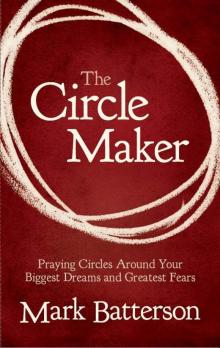- Home
- Mark Batterson
The Circle Maker_Praying Circles Around Your Biggest Dreams and Greatest Fears Page 2
The Circle Maker_Praying Circles Around Your Biggest Dreams and Greatest Fears Read online
Page 2
The legend of Honi the circle maker was like a revelation of the power of prayer. It gave me a new vocabulary, a new imagery, a new methodology. It not only inspired me to pray bold prayers but also helped me pray with more perseverance. I started circling everyone and everything in prayer. I drew particular inspiration from the march around Jericho, when God delivered on a four-hundred-year-old promise by providing the first victory in the Promised Land. While the story doesn’t explicitly mention the people taking up positions of prayer, I have no doubt that the Israelites were praying as they circled the city. Isn’t that what you instinctively do when you face a challenge that is way beyond your ability? The image of the Israelites circling Jericho for seven days is a moving picture of what drawing prayer circles looks like. It’s also the backdrop for this book.
Jericho March
The first glimpse of Jericho was both awe-inspiring and frightening. While wandering in the wilderness for forty years, the Israelites had never seen anything approximating the skyline of Jericho. The closer they got, the smaller they felt. They finally understood why the generation before them felt like grasshoppers and failed to enter the Promised Land because of fear.
A six-foot-wide lower wall and fifty-foot-high upper wall encircled the ancient metropolis. The mud-brick walls were so thick and tall that the twelve-acre city appeared to be an impregnable fortress. It seemed like God had promised something impossible, and His battle plan seemed nonsensical: Your entire army is to march around the city once a day for six days. On the seventh day you are to march around the city seven times.
Every soldier in the army had to have wondered why. Why not use a battering ram? Why not scale the walls? Why not cut off the water supply or shoot flaming arrows over the walls? Instead, God told the Israelite army to silently circle the city. And He promised, after they circled thirteen times over seven days, the wall would fall.
The first time around, the soldiers must have felt a little foolish. But with each circle, their stride grew longer and stronger. With each circle, a holy confidence was building pressure inside their souls. By the seventh day, their faith was ready to pop. They arose before dawn and started circling at six o’clock in the morning. At three miles per hour, each mile-and-a-half march around the city took a half hour. By nine o’clock, they began their final lap. In keeping with God’s command, they hadn’t said a word in six days. They just silently circled the promise. Then the priests sounded their horns, and a simultaneous shout followed. Six hundred thousand Israelites raised a holy roar that registered on the Richter scale, and the walls came tumbling down.
After seven days of circling Jericho, God delivered on a four-hundred-year-old promise. He proved, once again, that His promises don’t have expiration dates. And Jericho stands, and falls, as a testament to this simple truth: If you keep circling the promise, God will ultimately deliver on it.
What Is Your Jericho?
This miracle is a microcosm.
It not only reveals the way God performed this particular miracle; it also establishes a pattern to follow. It challenges us to confidently circle the promises God has given to us. And it begs the question: What is your Jericho?
For the Israelites, Jericho symbolized the fulfillment of a dream that originated with Abraham. It was the first step in claiming the Promised Land. It was the miracle they had been hoping for and waiting for their entire lives.
What is your Jericho?
What promise are you praying around? What miracle are you marching around? What dream does your life revolve around?
Drawing prayer circles starts with identifying your Jericho. You’ve got to define the promises God wants you to stake claim to, the miracles God wants you to believe for, and the dreams God wants you to pursue. Then you need to keep circling until God gives you what He wants and He wills. That’s the goal. Now here’s the problem: Most of us don’t get what we want simply because we don’t know what we want. We’ve never circled any of God’s promises. We’ve never written down a list of life goals. We’ve never defined success for ourselves. And our dreams are as nebulous as cumulus clouds.
Instead of drawing circles, we draw blanks.
Circling Jericho
More than a thousand years after the Jericho miracle, another miracle happened in the exact same place. Jesus is on His way out of Jericho when two blind men hail Him like a taxi: “Lord, Son of David, have mercy on us!” The disciples see it as a human interruption. Jesus sees it as a divine appointment. So He stops and responds with a pointed question: “What do you want me to do for you?”
Seriously? Is that question even necessary? Isn’t it obvious what they want? They’re blind. Yet Jesus forced them to define exactly what they wanted from Him. Jesus made them verbalize their desire. He made them spell it out, but it wasn’t because Jesus didn’t know what they wanted; He wanted to make sure they knew what they wanted. And that is where drawing prayer circles begins: knowing what to circle.
What if Jesus were to ask you this very same question: What do you want me to do for you? Would you be able to spell out the promises, miracles, and dreams God has put in your heart? I’m afraid many of us would be dumbfounded. We have no idea what we want God to do for us. And the great irony, of course, is that if we can’t answer this question, then we’re as blind spiritually as these blind men were physically.
So while God is for us, most of us have no idea what we want God to do for us. And that’s why our prayers aren’t just boring to us; they are uninspiring to God. If faith is being sure of what we hope for, then being unsure of what we hope for is the antithesis of faith, isn’t it? Well-developed faith results in well-defined prayers, and well-defined prayers result in a well-lived life.
If you read this book without answering this question, you will have missed the point. Like the two blind men outside Jericho, you need an encounter with the Son of God. You need an answer to the question He is still asking: What do you want me to do for you?
Obviously, the answer to this question changes over time. We need different miracles during different seasons of life. We pursue different dreams during different stages of life. We stake claim to different promises in different situations. It’s a moving target, but you have to start somewhere. Why not right here, right now?
Don’t just read the Bible. Start circling the promises.
Don’t just make a wish. Write down a list of God-glorifying life goals.
Don’t just pray. Keep a prayer journal.
Define your dream.
Claim your promise.
Spell your miracle.
Spell It Out
Jericho is spelled many different ways. If you have cancer, it’s spelled healing. If your child is far from God, it’s spelled salvation. If your marriage is falling apart, it’s spelled reconciliation. If you have a vision beyond your resources, it’s spelled provision. But whatever it is, you have to spell it out. Sometimes Jericho is spelled without letters. It’s a zip code you’re called to or a dollar figure that will get you out of debt. And sometimes Jericho has the same spelling as someone’s name. For me, Jericho has three different spellings: Parker, Summer, and Josiah.
When my friend Wayne and his wife, Diane, were expecting their first child, they started praying for their baby. They believed prayer was their primary parental responsibility, so why wait till their baby was born? Every evening, Wayne would lay hands on Diane’s stomach and pray the promises in Scripture that they had circled for their baby. During the early stages of pregnancy, they came across a book that said it was never too early to start praying for their baby’s future spouse. At first it seemed odd praying for a spouse before they even knew the gender of their baby, but they prayed for their baby and their baby’s spouse day after day until their due date.
Wayne and Diane decided to wait until birth to discover their baby’s gender, but they prayed that God would reveal what the baby’s name should be. In October 1983, the Lord gave them a girl’s name. It was spelled Jessi
ca. Then in December, the Lord gave them a boy’s name, and they started praying for Timothy. They weren’t sure why God had given them two different names, but they prayed circles around both Jessica and Timothy until Diane gave birth.
On May 5, 1984, God answered their prayers, and the answer was spelled Timothy. Wayne and Diane continued to circle their son in prayer, but they also kept praying for the girl that he would one day marry. Twenty-two years and two weeks of accumulated prayers culminated on May 19, 2006 — the day Timothy’s bride walked down the aisle. Her name? Jessica.
Here’s the rest of the story.
Their future daughter-in-law was born on October 19, 1983, the same month that God gave them the name Jessica. A thousand miles away, Wayne and Diane were praying for her by name. They thought Jessica would be their daughter, not their daughter-in-law, but God always has a surprise up His sovereign sleeve. For Wayne and Diane, Jericho has two spellings — Timothy and Jessica — but the same last name.
In case you’re wondering, Timothy was allowed to date girls who weren’t named Jessica! Wayne and Diane didn’t even tell Timothy that God had given them the name of his future spouse before he was born until after he was engaged.
I have the joy of serving as Timothy and Jessica’s pastor. So while Timothy and Jessica are the primary beneficiaries of their parents’ prayers, I’m a secondary beneficiary. They have been a huge blessing to National Community Church as small group leaders, and like every blessing, it traces back to a prayer circle.
Vague Prayers
A few years ago, I read one sentence that changed the way I pray. The author, pastor of one of the largest churches in Seoul, Korea, wrote, “God does not answer vague prayers.” When I read that statement, I was immediately convicted by how vague my prayers were. Some of them were so vague that there was no way of knowing whether God had answered them or not.
It was during this spiritual season, when God was challenging me to spell out my prayers with greater specificity, that I embarked on a ten-day Pentecost fast. Just like the 120 believers who prayed in an upper room for ten days, I felt led to fast and pray for ten days leading up to the day of Pentecost. My rationale was pretty simple: If we do what they did in the Bible, we might experience what they experienced. You can’t manufacture a miracle like Pentecost, but if you pray for ten days, a miracle like Pentecost might just happen.
During that ten-day Pentecost fast, I was teaching a series at our church titled “A Course in Miracles,” and we had just experienced one. We miraculously purchased a piece of Promised Land that we had circled in prayer for more than five years. We took stones that had been laid in the foundation and gave one to everyone as tangible tokens of the corporate miracle God had performed for National Community Church. Drawing on that corporate faith, we challenged people to personalize the question Jesus posed to the two blind men outside of Jericho: What do you want me to do for you? Then we wrote down our holy desires on those stones. I spelled out seven miracles and started circling them in prayer.
In the spirit of full disclosure, not all seven of the miracles I asked for have happened. In fact, one of them even seemed to backfire. I asked God to give us the movie theaters at Union Station where our church met for more than a decade, but instead of giving us the theaters, He took them away. The theaters were unexpectedly closed down, and we were given less than one week’s notice to vacate. It was extremely disappointing and disorienting at the time, but I have to admit that this apparent “anti-miracle” was the catalyst for some bigger and better miracles that have happened in its wake. What seemed like the wrong answer turned out to be the best answer. So not every prayer will be answered the way we script it, but I’m convinced of this: The miracles that have happened would not have happened if I hadn’t drawn a circle around them in the first place.
The more faith you have, the more specific your prayers will be. And the more specific your prayers are, the more glory God receives. Like Honi, who prayed for a specific type of rain, nuanced prayers give God an opportunity to reveal more shades of His sovereignty. If our prayers aren’t specific, however, God gets robbed of the glory that He deserves because we second-guess whether or not He actually answered them. We never know if the answers were the result of specific prayer or general coincidences that would have happened anyway.
That stone with seven miracles written on it sits on a shelf in my office. Occasionally I’ll pick it up and hold it in my hand while I pray. There isn’t anything magical about it, but it acts as prayer insurance. It insures that I don’t forget what I’m praying for. It also insures that God gets the glory when the miracles happen. When you spell out your prayers with specificity, it will eventually spell God’s glory.
The Ladder of Success
It’s easy to get so busy climbing the ladder of success that we fail to realize that the ladder is not leaning against the wall of Jericho. We lose sight of our God-ordained goals. Our eternal priorities get subjugated to our temporal responsibilities. And we pawn our God-given dream for the American dream. So instead of circling Jericho, we end up wandering in the wilderness for forty years.
A few years ago, I enjoyed a rare day with no agenda. I had just dropped off my family at LAX after a wonderful spring break in southern California. I stayed behind to speak at a leadership conference, but I had one day in between with nowhere to go and nothing to do, so I found a Starbucks along the Third Street Promenade in Santa Monica and spent the day circling Jericho.
That margin, along with a little California sunshine, made room for an epiphany. As I sipped my White Chocolate Mocha, it dawned on me that I had never really defined success for myself. I had written a couple books and started traveling on the speaking circuit, but neither of those goals was as fulfilling as I thought they would be. I often felt excitement mixed with a profound sadness as I scrambled through airport security on my way to whatever speaking destination was next. My life reminded me of the joke I would sometimes tell about the airline pilot who came over the intercom and said, “I have good news and bad news. The bad news is we’re lost; the good news is we’re making great time.” That’s what my life felt like, but it wasn’t a joke.
I’ve never met anyone who doesn’t want to be successful, but very few people have actually spelled out success for themselves. We inherit a family definition or adopt a cultural definition. But if you don’t spell it out for yourself, you have no way of knowing if you’ve achieved it. You might achieve your goals only to realize that they should not have been your goals in the first place. You circle the wrong city. You climb the wrong ladder.
Variant Spellings
As window-shoppers strolled up and down the promenade, I scribbled a personal definition of success on a napkin. That napkin may as well have been a stone tablet inscribed by the finger of God on Mount Sinai. God redefined success and spelled it out for me on that napkin. Like definitions in the dictionary that capture different dimensions of a word, I jotted down three variant spellings.
The first definition may sound generic, but it’s specific to any and every situation:
1. Do the best you can with what you have where you are. Success is not circumstantial. We usually focus on what we’re doing or where we’re going, but God’s primary concern is who we’re becoming in the process. We talk about “doing” the will of God, but the will of God has much more to do with “being” than “doing.” It’s not about being in the right place at the right time; it’s about being the right person, even if you find yourself in the wrong circumstances. Success has nothing to do with how gifted or how resourced you are; it has everything to do with glorifying God in any and every situation by making the most of it. Success is spelled stewardship, and stewardship is spelled success.
The second definition I wrote down captures my calling. Whether I’m writing or preaching or parenting, this is the driving passion of my life:
2. Help people maximize their God-given potential. Potential is God’s gift to us; what we do with it
is our gift back to God. Helping people maximize their God-given potential is why God put me on this planet. That is what gets me up early and keeps me up late. Nothing is more exhilarating to me than seeing people grow into their God-given giftedness.
The third definition reveals the deepest desire of my heart:
3. My desire is that the people who know me the best respect me the most. Success is not measured by how many people I pastor or how many books I sell; success is living life with such authentic integrity that those who know me best actually respect me most. I couldn’t care less about fame or fortune. I want to be famous in my home. That is the greatest fortune.
If you don’t have a personal definition of success, chances are you will succeed at the wrong thing. You’ll get to the end of your life and realize that you spelled success wrong. And if you spell it wrong, you’ll get it wrong.
You need to circle the goals God wants you to go after, the promises God wants you to claim, and the dreams God wants you to pursue. And once you spell Jericho, you need to circle it in prayer. Then you need to keep circling until the walls come tumbling down.
Get Outside the Walls
Circling Jericho gave the Israelites a 360-degree perspective of the walled promise. It helped them wrap their spirits around the mud-brick miracle. It gave definition to the fifty-foot-high dream. That is precisely what prayer does. It helps you get outside the problem. It helps you circle the miracle. It helps you see all the way around the situation.

 Jack Staples and the Ring of Time
Jack Staples and the Ring of Time Jack Staples and the City of Shadows
Jack Staples and the City of Shadows Jack Staples and the Poet's Storm
Jack Staples and the Poet's Storm Whisper
Whisper The Circle Maker_Praying Circles Around Your Biggest Dreams and Greatest Fears
The Circle Maker_Praying Circles Around Your Biggest Dreams and Greatest Fears